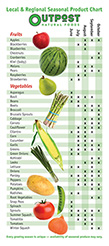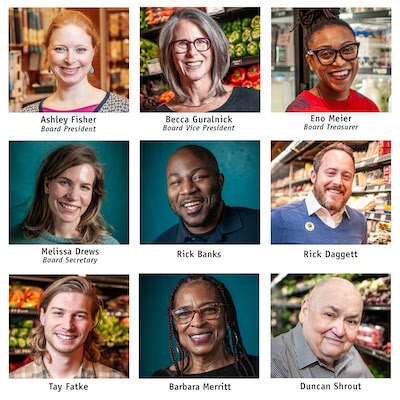My Dream Food Co-op

One of the really cool parts of my day job at Feeding America is that I get to travel around the country to join, start, simplify, complicate, explicate, and otherwise advance some of the big conversations surrounding food, food access, hunger, and food systems. It’s really one of the favorite parts of my job.

So it was to my great pleasure that many of the same themes emerged in the sessions, keynotes and side conversations at the 2013 Consumer Cooperative Management Association (CCMA) conference in Austin, which I attended last week with more than 400 co-op staff and board members from across the nation, including some of my fellow Outpost board members and store managers.
Going into CCMA, I made an intentional choice not to talk about food access, but when I got there, the opportunity to connect my day job to my work of the Outpost board on your behalf, and to cooperative movement at-large, was too rich an opportunity to pass up.
“Food Access for All: Food Access in Mixed Income Communities” was the first session I attended and it stood out to me because the session facilitators asked one simple question – if you were to build the ideal/dream co-op what would it look like? As I sat there thinking about it, it struck me that my ideal food bank and ideal co-op shared more in common than differences.
For example, I believe that both food banks and food co-ops must become more active participants in shaping, improving and protecting the policy environments they operate in through advocacy. We have a lot to lose on the policy front with all of the proposed changes in the Farm Bill, and how that piece of omnibus legislation is written and designed. Who better to inform that process than us, the farmers, eaters, environmentalists and advocates for low-income families?
We also must engage our constituents and stakeholders in a process of co-creation. Whether it’s a food bank program or a full service food co-op in a low-income community, the people availing themselves of the service will not own anything that they don’t have a hand in creating. We risk either failing completely or falling into the trap of being food missionaries if we believe that we can be successful otherwise.
Also, both food banks and food co-ops need to create more robust partnerships for collective impact. Imagine a food co-op that had real goals and metrics to decrease the rates of food insecurity in their communities. Imagine a food bank that had goals to decrease the rates of diet-related diseases and other community health outcomes. Imagine that we were able to forge the trusting partnerships and create the mutually reinforcing activities that leveraged and built upon on our individual assets. Imagine how successful we could be.
Finally, in order to make all of this work, we need adaptive, values based leadership. The key threat to us achieving all of the above is that in the current world of restricted resources, we will try to pick out and amplify the small differences in our missions to corner the market on resources rather than focusing and investing in our similarities – or in other words, cooperation. Freud called this the narcissism of small differences. And it will take an adaptive form of leadership, one that is uncompromising in its values, but also open to change, to bring us together and align us toward our broad goals.
Ok, so you have a sense of the characteristics of my dream food co-op/dream food bank. What’s yours?
– David Lee, board member
Comments
Bloggers
Archived Columns
Tags
Archives
-
April 2024 (1)
March 2024 (1)
February 2024 (1)
December 2023 (1)
August 2023 (1)
March 2023 (1)
February 2023 (1)
November 2021 (1)
September 2021 (1)
November 2020 (1)
October 2020 (1)
July 2020 (1)
June 2020 (1)
May 2020 (1)
February 2020 (1)
January 2020 (1)
December 2019 (1)
November 2019 (1)
October 2019 (1)
August 2019 (2)
May 2019 (1)
March 2019 (2)
January 2019 (1)
December 2018 (1)
November 2018 (1)
October 2018 (2)
September 2018 (1)
February 2018 (1)
November 2017 (2)
October 2017 (1)
July 2017 (2)
March 2017 (1)
February 2017 (1)
January 2017 (1)
December 2016 (2)
November 2016 (1)
August 2016 (2)
July 2016 (2)
March 2016 (2)
February 2016 (2)
January 2016 (1)
December 2015 (1)
October 2015 (3)
August 2015 (1)
July 2015 (2)
June 2015 (1)
March 2015 (2)
February 2015 (2)
January 2015 (2)
December 2014 (2)
November 2014 (1)
October 2014 (3)
August 2014 (2)
July 2014 (1)
June 2014 (2)
May 2014 (2)
April 2014 (1)
March 2014 (2)
February 2014 (2)
January 2014 (2)
December 2013 (1)
November 2013 (2)
October 2013 (1)
July 2013 (2)
June 2013 (1)
May 2013 (2)
April 2013 (1)
March 2013 (2)
February 2013 (1)
January 2013 (2)
December 2012 (3)
November 2012 (1)
October 2012 (3)
September 2012 (2)
August 2012 (4)
July 2012 (4)
June 2012 (6)
May 2012 (3)
April 2012 (4)
March 2012 (6)
February 2012 (8)
January 2012 (3)
December 2011 (4)
October 2011 (4)
September 2011 (3)
August 2011 (5)
July 2011 (7)
June 2011 (1)
May 2011 (2)
April 2011 (7)
March 2011 (10)
February 2011 (12)
January 2011 (11)
December 2010 (19)
November 2010 (13)
October 2010 (22)
September 2010 (16)
August 2010 (24)
July 2010 (33)
June 2010 (5)
May 2010 (52)
April 2010 (37)
March 2010 (55)
February 2010 (44)
January 2010 (46)
December 2009 (40)
November 2009 (26)
October 2009 (37)
September 2009 (34)
August 2009 (24)
July 2009 (21)
June 2009 (29)
May 2009 (30)
April 2009 (33)
March 2009 (16)
February 2009 (2)
January 2009 (5)
November 2008 (1)
October 2008 (1)
September 2008 (2)
August 2008 (3)
July 2008 (2)
June 2008 (6)
May 2008 (2)
April 2008 (10)
March 2008 (5)
February 2008 (5)
January 2008 (12)
December 2007 (5)
October 2007 (3)
August 2007 (3)
July 2007 (1)
June 2007 (5)
May 2007 (4)
April 2007 (6)
March 2007 (3)
February 2007 (3)
January 2007 (4)
December 2006 (2)
October 2006 (2)
September 2006 (5)
August 2006 (8)
0 (1)










